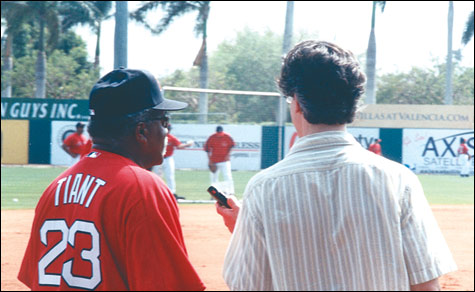
ON THE BEAT: A spring training chat in 2005. |
In April 1999, two weeks after I started on the job at the Providence Phoenix, the FBI raided City Hall, formally unveiling the federal investigation that would land Vincent A. "Buddy" Cianci Jr., Rhode Island's rascal king, behind bars.
As if we needed it, the raid was an all-too-obvious reminder that the Ocean State is a great place to be a reporter.
Ten years later, Rhode Island remains the gift that keeps on giving — as some of us scribes are fond of saying — with multitudinous intrigues and lots of compelling characters packed into this postage stamp-sized state.
Organized crime remains on the wane, as does, sadly, the Providence Journal, like many of its daily counterparts across the nation, to the detriment of our civic life. The broad cutbacks in journalism raise troubling questions about which stories will go undiscovered and unreported.
During my long-ago introduction to Rhode Island in the late '80s, I regularly stepped into the ProJo's fortress-like Fountain Street news bunker as sunlight was dawning, picking up stacks of the editions stocked with local news from throughout the state, rewriting some of it for the Associated Press. A commuter from Massachusetts at the time, my acquaintance with the state was fleeting. If you'd told me I'd return years later, trying to emulate a bit of what the late Dave O'Brien did while creating the "Don't Quote Me" media column for the Boston Phoenix, I would have scarcely believed it.
Yet life takes unpredictable turns. The same is true of the Ocean State's perpetually fertile vein of news, and I've been privileged to enjoy the alt-weekly journalist's brief of reporting and writing lengthy articles on the various topics, from the serious to the fanciful, appealing to the wide-ranging interests of Rhode Islanders.
I mean, to name just a few examples, where else can you examine self-censorship in the local media (see "Feeling inhibited," October 18, 2002); the connection between television, money, and politics (see "In whose interest," February 13, 2002); and links between big media and the Red Sox ("Inside baseball," July 29, 2005), while also penning a satiric piece about privatization (see "Struever Brothers to redevelop City Hall," August 2, 2006), a tongue-in-cheek comparison of two very different guys ("Revealed at last: the curious similarities of Steve Laffey and Greg Palast," February 14, 2008), and visiting bars and liquor stores in the name of earning a paycheck ("Beer: the next generation," News, February 6, 2008)?
Once, while working for a largish daily in Massachusetts, an editor grossly simplified the lead in my story about a local woman who had worked as a nurse in Pakistan, training members of the Afghan resistance in medical skills. His objection? The first paragraph was nearly 30 words — a challenge, the editor thought, to the education level of the average reader.
By contrast, I've always felt the Phoenix takes for granted that its readers are highly literate, voraciously interested in an array of subjects, and capable of appreciating sharp political analysis and arts and entertainment coverage dished out with a bit of attitude.
If I used the word "interregnum" in a piece ("Countdown," July 13, 2001) on Buddy Cianci, or "shaudenfraude" in a story about the fallout of a vice bust at an adult entertainment store in Johnston ("It's a scandal," February 1, 2002), there was no anxiety that they would be excised.
And while comment from the ProJo hierarchy was practically non-existent after I happened upon my niche in writing about local media, there was real news value in examining the state's most important news organization, particularly when it barely covered a labor stalemate that persisted there from 2000 to 2003.
As demonstrated by Steven Stycos's excellent story this week, examining salaries in the local health-care sector, the Phoenix continues to report stories that might otherwise go unreported, in a way that's different from other media organizations.
The media future remains uncertain. While blogs and other forms can take up some of the slack, meaningful journalism tends to be costly and time-consuming. Rhode Island demands serious scrutiny, so one can only hope that it continues to receive it, from a variety of sources.
As I leave for a political reporting gig at WRNI (1290 AM), Rhode Island's public radio station, I'd like to thank all of you who have read and continue to read the Phoenix.
It takes a lot of people to make it all happen, so thank you, Peter Kadzis; Stephen Mindich; Steve Brown; Lou Papineau; Phillipe + Jorge; Phoenix contributors past and present (particularly Stycos and Brian C. Jones); the crack sales and graphic team on Chestnut Street; and my friend Matt Jerzyk, for helping to push me into the blogosphere.
As we say in Providence, see you around the campus.